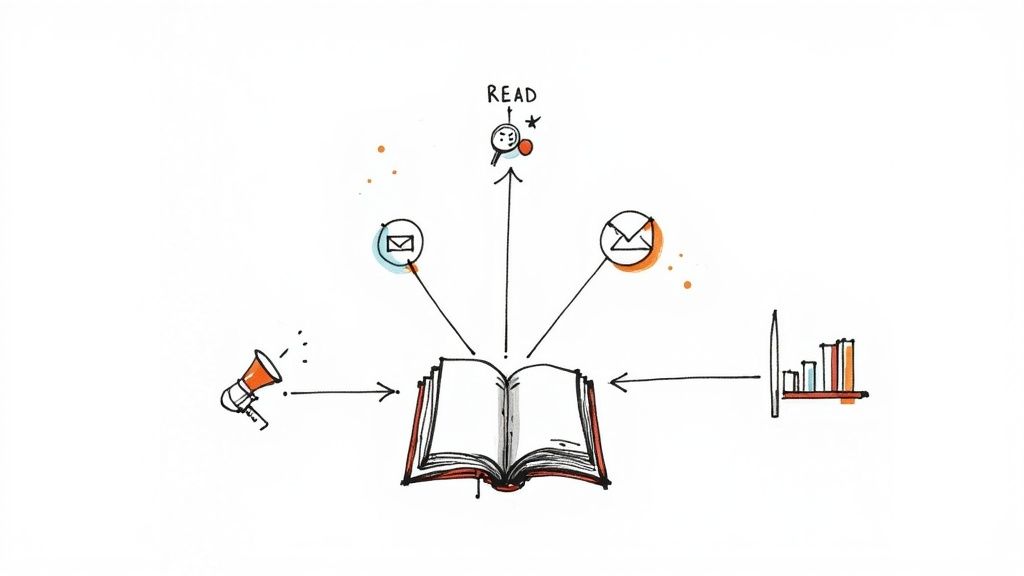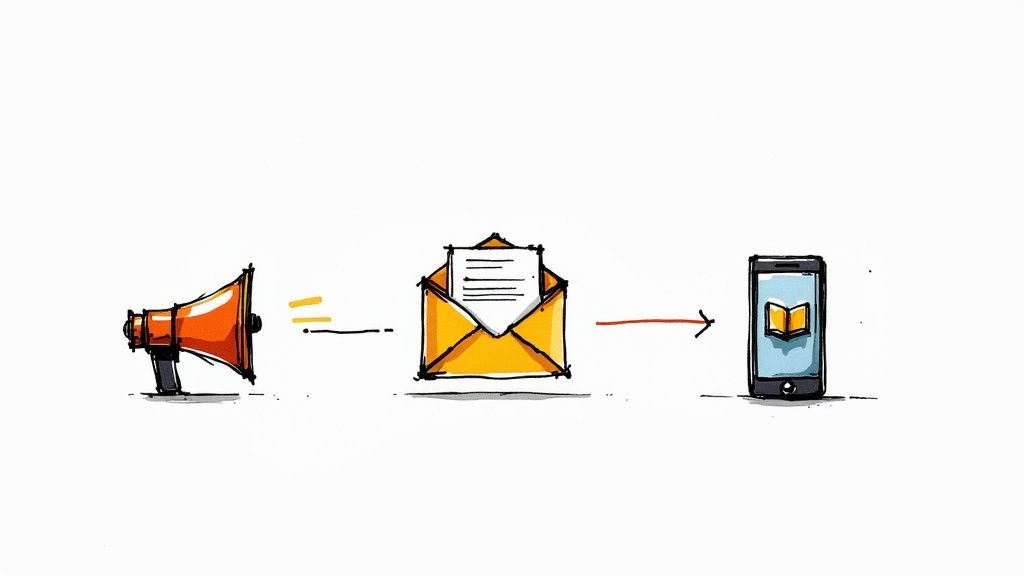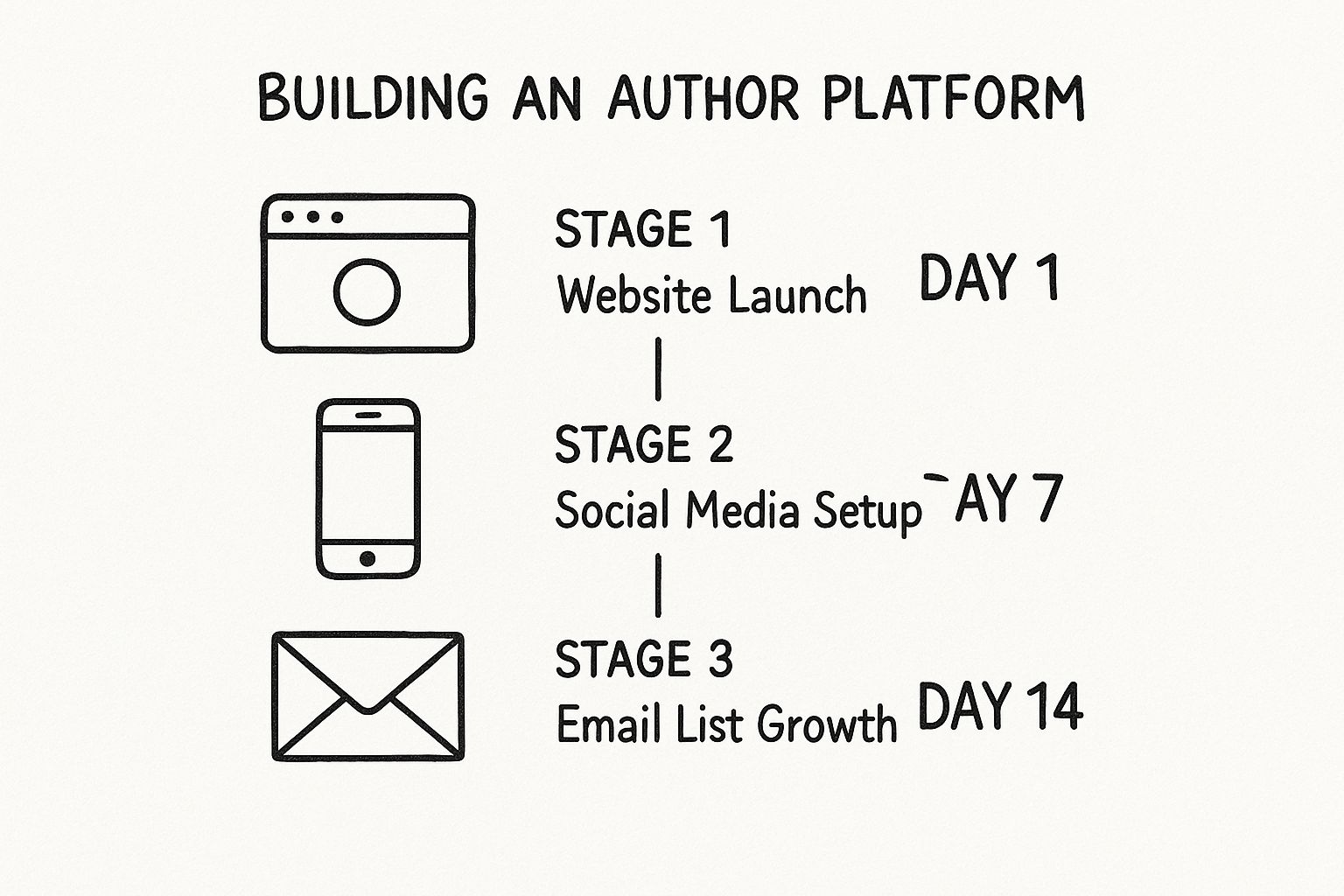Effective Marketing Plan for Authors to Boost Book Sales

A solid marketing plan for authors is your strategic roadmap, the bridge that connects your finished book to its ideal readers. It’s far more than just running a few ads; it’s a creative blueprint for building an audience, generating genuine excitement, and turning your writing into a sustainable career.
Why Your Book Needs a Marketing Plan

Let’s be honest. Finishing your manuscript was a monumental achievement, but in many ways, it was just the beginning of the journey. In a publishing world where success is often measured by visibility just as much as literary merit, even the most brilliant story isn't guaranteed to find an audience on its own. This is where a strategic marketing plan becomes your most powerful tool.
Thinking about marketing doesn't mean you have to become some slick, pushy salesperson. Not at all. It’s really about shifting your mindset from writer to author-entrepreneur—creatively and authentically connecting your work with the very people who are out there searching for a book just like yours. A good plan empowers you, putting you in the driver's seat of your author career.
Navigating a Competitive Publishing Landscape
The book market today is incredibly competitive. That’s just the reality. Every single day, a flood of new titles hits the shelves, all vying for reader attention. Without a plan, your book is essentially a message in a bottle tossed into a vast ocean, just hoping someone stumbles upon it.
Think about the numbers for a second. The global book market is projected to hit USD 142.96 billion in 2026. In the United States alone, somewhere between 600,000 to 1,000,000 books are published annually. In such a saturated environment, a marketing plan helps you cut through the noise. It lets you use modern tools like e-books, audiobooks, and data-driven digital strategies to zero in on the right readers. If you're curious, you can read more about how technology is shaping book promotion and see the latest trends.
A marketing plan transforms promotion from a dreaded, overwhelming chore into an exciting and manageable extension of your storytelling. It’s your roadmap for getting your book into the hands of eager readers.
The Power of a Strategic Approach
A well-crafted marketing plan brings structure and focus to what can otherwise feel like chaos. It forces you to make critical decisions early on, ensuring your efforts are targeted and effective. Instead of just throwing spaghetti at the wall to see what sticks, you'll operate with clear intention.
This strategic approach helps you:
- Define Your Audience: You'll pinpoint exactly who is going to love your book. This makes every marketing dollar and every minute you spend count.
- Build Your Platform: It gives you a plan for creating a direct line to your readers through your website, an email list, and a social media presence.
- Create Momentum: You can engineer a successful book launch that captures the attention of both readers and those all-important retail algorithms.
- Sustain Sales: Most importantly, you'll have long-term strategies in place to keep your book visible and selling long after its debut.
Ultimately, a marketing plan is an act of advocacy for your work. It's the framework that gives your story its best possible chance to thrive.
Finding Your Ideal Reader and Niche

Let's start with a hard truth many authors learn too late: trying to market your book to everyone is the fastest way to sell it to no one. It sounds counterintuitive, but the most powerful marketing plan for authors begins with a laser focus on exactly who your book is for. Not everyone will be interested, and that’s more than okay—it’s strategic.
We have to move past vague descriptions like "women aged 30-50." To truly connect, you need to dig into psychographics—the attitudes, values, and inner worlds of your readers. What do they believe in? What are their passions? What keeps them up at night? Answering these questions lets you craft marketing that feels personal and resonates deeply.
Crafting Your Ideal Reader Avatar
To make this target reader real, we create an "Ideal Reader Avatar." This isn't just a demographic profile; it's a fictional character who represents your perfect reader. Give this person a name, a backstory, and a personality. Suddenly, you're not marketing to an abstract concept; you're talking to a real person.
Let's build one together. Imagine your ideal reader is "Eleanor." Now, let's flesh her out:
- Her Daily Grind: What does Eleanor's average Tuesday look like? Is she a freelance graphic designer who works from a home office, or a busy nurse on 12-hour shifts? Does she listen to podcasts on her commute or true-crime documentaries while she cooks?
- Her Reading Life: Where does she get her books? Does she love wandering through a local indie bookstore, or is she a one-click pro on Amazon? Who are her favorite authors? Is she in a book club?
- Her Online Hangouts: Which social media platforms is she on? Is she scrolling through beautiful book photos on Instagram, or is she deep in a niche Facebook group debating plot twists?
The answers are gold. If you know Eleanor follows specific #Bookstagrammers and listens to historical fiction podcasts, you've just found your marketing channels. This avatar becomes the lens through which you make every promotional decision.
When you know exactly who you’re talking to, every marketing choice becomes easier. You’ll instinctively know whether a particular ad, social media post, or promotional partnership will connect with your audience.
Analyzing Comps and Finding Your Lane
With a clear picture of Eleanor in mind, it's time to figure out where your book sits on the shelf. This isn't about seeing other authors as competition; it's about finding your unique space in the market. Start by listing 3-5 comparable authors (or "comps")—writers whose fans would almost certainly love your book.
For each of these authors, break down their work:
- Genre & Subgenre: Don't just say "fantasy." Is it epic fantasy, cozy fantasy, or urban fantasy? Be precise. A psychological thriller is very different from a police procedural.
- Themes & Tropes: What are their signature moves? Do they lean into enemies-to-lovers, found family, or the lone wolf detective with a dark past?
- Author Brand: How do they present themselves? Are they the mysterious, academic type or the warm, accessible friend who shares behind-the-scenes content?
Subscribe & Get Your Free Marketing Plan Template
Receive regular updates on marketing best-practices, AI shortcuts, and get our proven 4-phase marketing roadmap for free.
Unsubscribe anytime.
This deep dive helps you nail down your Unique Selling Proposition (USP). This is what makes your book stand out. Maybe you write historical romance like Author A, but you inject the fast-paced plotting of Author B and set it in a unique location no one else is touching. That's your hook.
After identifying your ideal reader and your unique angle, a great next step is to connect with the people who already have your reader's trust. Learning how to find micro-influencers can be a game-changer for reaching dedicated readers and sparking authentic word-of-mouth. These are the bloggers and reviewers who have already built a relationship with Eleanor. Armed with your USP and a clear profile of your reader, you can pitch them with a message that’s impossible to ignore.
Building Your Author Platform Before Launch Day

Here’s a hard truth many authors learn too late: the single biggest mistake you can make is waiting for your book to be published before you start marketing. A successful book launch doesn't just happen out of the blue. It’s the final, visible result of a platform you've been carefully building, piece by piece, long before your book ever hits the shelves.
This "author platform" is simply the direct line of communication you have with your readers. Think of it as your personal media empire. While social media is a part of it, you don't actually own those followers. Algorithms can change overnight, accounts get shut down, and platforms can fade into obscurity. A solid platform gives you a reliable, stable way to reach the people who are genuinely excited about your work. It's the absolute foundation of any serious marketing plan for authors.
Your Author Website: The Digital Hub
Every author needs a professional website. Period. It doesn't have to be a sprawling, expensive masterpiece, but it absolutely must look polished and be a breeze for visitors to navigate. This site is your central hub—the one place you can direct everyone to find out about you and your books. It's what makes you look like a pro.
Your website is the anchor for every other marketing effort you'll make. It's where you'll host your blog, show off your gorgeous book covers, share your bio, and—most critically—collect email addresses. To really dig into the nitty-gritty of what makes effective author marketing, take a look at our complete book marketing strategies guide that truly connects with readers.
A great author site has a few non-negotiable pages:
- Home: A warm welcome with a clear, immediate call-to-action (like signing up for your newsletter).
- About: Your author bio, a professional headshot, and a peek into your personal story. Let people connect with the human behind the books!
- Books: A dedicated page for each book, complete with the cover, blurb, and easy-to-find buy links.
- Contact: A simple way for readers, media, or other industry folks to get in touch.
To help you visualize how these pieces fit together, I've created a simple breakdown of the essential components and their roles.
Author Platform Components Breakdown
This table breaks down the essential components of an author platform, outlining the purpose and key action for each.
| Platform Component | Primary Purpose | Key Action Item |
|---|---|---|
| Author Website | To serve as the central, professional hub for all your content and brand identity. | Create a clean, easy-to-navigate site with essential pages (Home, About, Books, Contact). |
| Email List | To build a direct, owned communication channel with your most dedicated fans. | Set up an email service and create an enticing lead magnet to encourage sign-ups. |
| Lead Magnet | To provide a high-value incentive in exchange for a reader's email address. | Write a bonus short story, create a resource guide, or offer exclusive character content. |
| Blog/Content | To attract new readers through search engines and establish your expertise or voice. | Regularly publish content that your ideal reader would find interesting or helpful. |
| Social Media | To engage with readers, build community, and drive traffic back to your website. | Choose 1-2 platforms where your readers hang out and post consistently. |
Each of these elements works together to create a powerful system for connecting with readers and selling books long-term.
The Unrivaled Power of an Email List
If your website is your online home, your email list is your most valuable possession within it. Forget about vanity metrics like how many followers you have on social media. An email list is a curated group of readers who have raised their hands and explicitly said, "Yes, please contact me." These are your superfans in the making.
Building a strong platform leans heavily on smart email marketing and lead generation strategies because it creates a connection that's far more potent than a fleeting social media post. Think about it: an email lands directly in someone's personal inbox. That's an intimate, direct line of communication you just can't get anywhere else.
An email list isn’t just a list of names; it’s a curated audience of your most engaged readers. These are the people most likely to buy your next book, leave a review, and tell their friends about your work.
Growing Your List with an Irresistible "Bribe"
People are protective of their inboxes, and rightly so. They won't hand over their email address without a good reason. You need to offer them something valuable in return—what marketers call a lead magnet. This is your ethical bribe, and it's the secret to growing your list. Your lead magnet should be something exclusive and so perfectly tailored to your ideal reader that they can't help but want it.
Here are a few ideas for author lead magnets that work like a charm:
- A Bonus Short Story: Offer a prequel, a tale from a minor character's point of view, or a juicy deleted scene from your main novel.
- The First Few Chapters: Give readers a substantial free sample of your book to get them hooked and eager for the rest.
- A Character Q&A or Profile: Create a fun, "in-universe" document that gives fans behind-the-scenes details about the characters they adore.
- A Resource Guide: If you write nonfiction, this could be a handy checklist, a template, or a list of resources. For a fantasy author, it might be a beautifully designed map of your world.
By putting in the work to build these assets before you desperately need them, you shift your marketing efforts. Instead of a last-minute, panicked push, it becomes a natural, ongoing conversation with an audience that's already warm, engaged, and ready to hear from you.
Your Pre-Launch and Launch Day Game Plan
A successful book launch doesn't happen by magic—it's engineered. The momentum you build in the days leading up to and on release day can create a powerful ripple effect, influencing everything from Amazon’s algorithms to how readers discover you months down the line. This is where a detailed game plan, a critical piece of your marketing plan for authors, turns wishful thinking into a concrete strategy.
The real work starts long before anyone can click "buy." That 90-day pre-launch window is your runway. It's when you methodically build anticipation, collect social proof, and get your most dedicated readers ready to act. You’re not just releasing a book; you're creating an event people are genuinely excited to join.
The 90-Day Pre-Launch Countdown
Three months before your book goes live is when the first gears should start turning. This phase isn't about shouting "buy my book!" from the rooftops. It’s about strategic reveals and pulling your community closer.
- 90 Days Out: Build Your Street Team. Think of a street team as your volunteer army of superfans. They get early access and, in return, agree to help you spread the word. Start recruiting from your email list and most engaged social media followers. These are the champions who will share your posts, leave those crucial early reviews, and generate authentic excitement.
- 60 Days Out: Plan the Cover Reveal. Your cover is a huge marketing tool. Treat its reveal like an event. Tease it for a week, then unveil it across your website, newsletter, and all social channels at the same time. Rally your street team and author friends to share it far and wide for maximum impact.
- 45-30 Days Out: Send Out Advance Reader Copies (ARCs). Getting early reviews is not optional. It’s essential. Start sending digital ARCs to your street team, book bloggers, and influencers who love your genre. You can use services like BookSirens or NetGalley to manage this, or just email them out yourself. The mission is to have a solid base of reviews ready to go live the moment your book is available.
The image below gives a good sense of the foundational marketing elements you should already have in place to make these pre-launch tactics effective.

As you can see, having a website and an email list isn't just a nice-to-have; it's the platform from which you'll launch your entire campaign.
Mapping Out Launch Week
Once launch week hits, your job is to coordinate all the seeds you've planted. The goal is to concentrate as much activity as possible into a very short window. This spike in sales and engagement is what tells retailer algorithms that your book is a hot item, which can skyrocket its visibility.
Here’s what a typical launch week could look like:
- Monday (Day Before Launch): Hit your email list with a "It's coming tomorrow!" message. Nudge your street team, reminding them the big day is here and asking them to have their reviews ready to post.
- Tuesday (Launch Day!): This is your all-out blitz. Announce the launch everywhere—email, social media, a banner on your website. Spend the day in the trenches: engage with every comment, share reader posts, and thank everyone who supports you. If a limited-time launch price is part of your plan, now's the time.
- Wednesday & Thursday: Shift your focus to promotions. This is the ideal window to run a BookBub Featured Deal (if you're lucky enough to land one) or ads with other paid newsletter services. Fire up your Amazon and social media ad campaigns.
- Friday: Send a "thank you" email to your list. Share a few early results or a fun behind-the-scenes photo from the week. It’s a small touch that reinforces that sense of community and makes your readers feel appreciated.
- Saturday & Sunday: Keep the ads running and stay active on social media. This is also a fantastic time to host a live Q&A on Instagram or Facebook to connect directly with new readers who found you during the launch week buzz.
Key Takeaway: A book launch is a manufactured event. Your pre-launch activities build the pressure, and your launch week plan is the coordinated release that turns that pressure into a powerful burst of sales and visibility.
How to Lead Your Launch Team
Your street team can be your single most powerful marketing asset, but they need clear instructions. Simply asking them to "help spread the word" is too vague and won't get you the results you need.
Instead, give them a simple playbook. Provide them with:
- Pre-written social media posts to make sharing effortless.
- A folder of graphics, including the cover, quote cards, and other promo images.
- Specific, timed "asks" so they know exactly when you need them to post their review or share the cover.
- Exclusive access like a private Q&A or bonus content to make them feel like valued insiders.
This level of organization is what separates a weak launch from a strong one. For an even deeper look at generating buzz and getting media attention, our guide on how to publicize a book provides advanced strategies that perfectly complement this game plan. When you treat your launch like a professional campaign, you give your book the absolute best chance to succeed.
Keeping Your Book Visible After Launch
https://www.youtube.com/embed/eKyAOjH3Crk
The big launch day is an absolute sprint, but building a lasting career as an author is a marathon. It's an incredible feeling to see that sales spike during launch week, but what about the month after? Or next year? The best marketing plans for authors aren't just about that initial splash; they're built for the long haul, keeping your book in front of readers long after the release-day buzz dies down.
This is where you shift gears from a one-time promotional blast to building an evergreen marketing engine. The goal is to create systems that keep discovering new readers for you, giving your book a long and healthy life. This long-tail approach is what turns a single successful book launch into a genuinely profitable author business.
Put Your Reviews to Work as Social Proof
Your book reviews are so much more than just star ratings; they are a treasure trove of marketing gold. Every positive review serves as powerful social proof—that simple but potent psychological trigger where people follow the lead of others. When a potential reader sees that dozens of other people not only read but loved your book, their hesitation to click "buy now" melts away.
So, don't just let those glowing reviews sit on Amazon and Goodreads. You need to actively weave them into your marketing.
- Fuel Your Ads: Pull the most compelling, punchy phrases from reviews to use in your Facebook or Amazon ad copy. A line from a real reader like, "I stayed up all night to finish this!" is often far more convincing than anything you could write yourself.
- Create Shareable Graphics: Use a simple tool like Canva to whip up some eye-catching graphics featuring a short, powerful quote from a 5-star review. Share these across your social media channels to keep your book top-of-mind.
- Build Credibility on Your Website: Create a dedicated "Praise" or "Reviews" section on your book's sales page. Featuring your best reviews right there builds instant trust with anyone who lands on your site.
By making reviews a core part of your ongoing promotion, you’re constantly reinforcing the message that your book is a must-read, backed by an army of happy readers.
Play the Long Game with Content Marketing
Content marketing is the ultimate slow burn. It’s the art of creating and sharing valuable free material—think blog posts, videos, or podcast episodes—that doesn't scream "buy my book!" but instead sparks interest in its topics or your expertise. While it won't give you the instant gratification of a paid ad, it's one of the most effective ways to build a loyal, long-term audience.
For example, a fiction author whose thriller is set in the world of cybersecurity could write blog posts about recent real-world data breaches. A nonfiction author who wrote a book on personal finance could create short videos with quick tips on saving money. This isn't about selling; it's about serving. You attract your ideal readers by giving them value that aligns with their interests.
Content marketing is about establishing yourself as a trusted voice in your space. The goal is to become the go-to author people think of when they're looking for their next great read in your genre.
Guest blogging and appearing on podcasts are especially powerful here because they let you tap into an audience someone else has already built. To keep the momentum going and ensure your book keeps finding new readers, consider folding some effective public relations strategies into your post-launch plan.
Get Smart About Your Marketing Budget and ROI
Alright, let's talk numbers. As you settle into long-term promotion, you have to get practical about your budget. "Marketing" shouldn't be a black hole you just toss money into. Think of it as an investment, and every good investor tracks their return.
Start by setting a realistic monthly marketing budget. This doesn't have to be massive. Even $50 or $100 a month can keep a steady stream of Amazon ads running, driving consistent traffic and sales. The key here is consistency, not a huge one-time spend.
To track your Return on Investment (ROI), you simply need to compare what you spend to what you earn. If you spend $50 on ads in a month and see an extra $150 in royalties, your ROI is fantastic. This data is your superpower. It lets you make smart decisions, like cutting the ads that are wasting money and putting more cash behind the ones that are profitably finding new readers.
This disciplined, data-driven mindset is what elevates your writing from a passion project to a sustainable business. For a deeper dive into promotional tactics that get results, you might find our guide on how to promote your book helpful. Making sure your book stays visible after the launch is the final, crucial piece of the puzzle, ensuring your stories find their audience for years to come.
Answering Your Nagging Author Marketing Questions
Even with the best-laid plans, a few nagging questions always seem to crop up. That’s perfectly normal—every author hits these sticking points. Let's get straight to it and tackle some of the most common hurdles you'll face, with practical, no-nonsense answers to keep you moving forward with confidence.
From figuring out your budget to avoiding social media burnout, think of this as a quick-reference guide to clearing up the confusion.
How Much Money Do I Really Need to Market My Book?
This is the big one, isn't it? The most honest answer is: it varies wildly. But the good news is you don’t need a massive publisher’s budget to make an impact. A better question to ask is, "How can I be smart with the budget I actually have?"
Many authors I know find success starting small, often with just $50 to $100 per month for ongoing promotions like Amazon ads. The secret isn't how much you spend in one go, but how consistently and intelligently you invest it. Forget the huge, one-time marketing blitz; think sustained, strategic, smaller efforts.
Your marketing budget isn't just an expense; it's a direct investment in your book's long-term health. Get comfortable tracking your Return on Investment (ROI). If you spend $1 on an ad and make $2 in royalties, that’s a winning formula you can slowly scale up.
For a brand-new launch, you might set aside a slightly larger but still manageable sum, maybe in the $300-$500 range. This could realistically cover a few key activities:
- Several paid newsletter promotions with services like Fussy Librarian or Bargain Booksy.
- A small, tightly targeted Amazon or Facebook ad campaign to run during your launch week.
- The fee for a review service like BookSirens, if you decide that's a good fit for you.
The most important takeaway? Just start somewhere. Track what happens, and only double down on what’s actually selling books.
Which Social Media Platform Is Best for Authors?
Stop right there. Trying to be everywhere at once is the fastest way to burn out and hate marketing. The "best" platform isn't the one with the most users—it's the one where your ideal readers already spend their time.
Go back to that Ideal Reader Avatar you created. Where would they realistically hang out online?
- BookTok & Instagram (Bookstagram): These are visual powerhouses, an absolute must for genres with strong aesthetics like fantasy, romance, and YA. If your audience gets excited by gorgeous cover reveals and quick, snappy video content, this is your turf.
- Facebook: It's still a titan for building community, especially within niche reader groups. If your readers are a bit older or you want a space for deeper, more meaningful conversations, Facebook Groups are incredibly powerful.
- Pinterest: This is a fantastic, and often completely overlooked, tool. It works especially well for nonfiction authors (think checklists, infographics) and fiction writers in visual genres. A historical fiction author could create "mood boards" for their setting, or a cookbook author can share recipes. It’s less of a social network and more of a visual search engine.
My best advice: Pick one or two platforms and commit. Go deep, learn the culture, and build a genuine presence. It’s so much better to be a beloved, active member of one community than a silent ghost haunting five of them.
Should I Start a Blog as an Author?
Blogging can be an incredible asset, but let's be real: it’s not a great fit for every author. The authors who succeed with blogging have a laser-sharp, consistent focus. As publishing expert Jane Friedman often points out, the average author doesn't see much return from a generic blog because it demands a serious, long-term commitment to a clear content strategy.
Before you even think about setting one up, ask yourself these tough questions:
- Do I have a well-defined topic? Nonfiction authors have it easier here; they can blog about their area of expertise. Fiction authors need to get creative and find a related theme. For instance, a historical mystery author could blog about fascinating real-life unsolved crimes from that era.
- Do I actually enjoy it? If writing blog posts feels like a soul-crushing chore, you won’t stick with it long enough to see any results. Consistency is everything, and gaining traction often means posting multiple times a week at the start.
- Does it serve my audience? The whole point is to provide value to your readers. A personal diary about your writing process rarely attracts new fans unless you're already famous.
If you can answer all three with a resounding "yes," then go for it! If not, your precious time and energy are probably better spent growing your email list or engaging on your chosen social media platform.
Feeling swamped by all the marketing assets you need to create? Let ManuscriptReport.com do the heavy lifting. We can generate your blurbs, ad copy, social media posts, and even a full blog series from your manuscript in minutes, saving you time and getting you back to writing. Get your complete marketing report today!
Enjoyed this article? Subscribe for more + get a free marketing roadmap template.
Receive regular updates on marketing best-practices, AI shortcuts, and get our proven 4-phase marketing roadmap template for free.
Unsubscribe anytime.
Related Articles

6 Essential Book Marketing Strategies for Romance Novels
Discover 6 proven strategies to market your romance novel effectively and boost sales.

7 Budget-Friendly Book Marketing Strategies: Complete Guide for Indie Authors
Master budget book marketing with 7 proven strategies that work on $0-$500 budgets. Real ROI data, free tools, and actionable tactics for indie authors.

Mastering Amazon KDP Keywords for More Sales
Unlock your book's potential with our guide to Amazon KDP keywords. Learn proven strategies to find high-impact keywords that attract readers and boost sales.